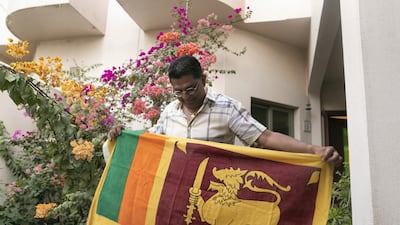Sri Lankan residents in the UAE say the deepening constitutional crisis in their homeland has stirred up memories of the country's brutal civil war and fear it could lead to fresh divisions.
Sri Lanka’s President Maithripala Sirisena stunned the country and the rest of the world two weeks ago when he sacked Prime Minister Ranil Wickremesinghe over allegations of an Indian-backed assassination plot and suspended parliament.
Mr Wickremesinghe has refused to recognise his dismissal — branding the move a coup — and remains ensconced in the prime minister's official Temple Trees residence in Colombo, which is surrounded by his supporters to prevent his removal.
The president's appointed successor, Mahinda Rajapaska, is also mired in controversy following his first tenure as the country's premier.
Mr Rajapaksa led the country from 2005 to 2015 and has the backing of Sri Lanka’s Sinhala majority community for ending the 25-year civil war with the Liberation Tigers of Tamil Eelam (LTTE), a rebel group of minority Tamils fighting for independence.
The Tamil separatist guerrillas were defeated in 2009. But Mr Rajapaksa has faced widespread allegations of human rights abuse over claims he targeting thousands of Tamil civilians in the final weeks of the war against the LTTE militant group, a charge he has denied.
Sri Lankans in the UAE are watching events unfold with keen interest and no shortage of concern.
Most believe the dissolution of parliament and a call for early elections is the answer to resolve the political impasse in their island nation.
Kalum Sujith, 42, a Dubai resident, believes the political turmoil is tarnishing Sri Lanka's reputation on the world stage.
“The situation is really bad now,” he said.
“The country is not stable so my hope is they go for elections. There have been strikes, government entities are not working properly and this is affecting people.
“I’m not a supporter of any political party, I’m a supporter of democracy. This is also not good for us internationally. There will be less of respect for Sri Lanka abroad.”
Critics of Mr Rajapaska accuse him of rights abuses, corruption, a crackdown on essential freedoms and saddling the country with billions of dollars of debt to China during his time in power.
Mr Sujith believes Mr Rajapaksa’s return will divide the country.
“It is a nightmare. Mr Rajapaksa is respected for winning the war but people forget the reality that he has taken a lot of money from Sri Lanka and given this to China. He is dividing the people and the country. He is creating this tension to sustain himself.”
Criticism has also been laid at the door of the ousted Mr Wickremesinghe for being soft on the Tamil separatists and too eager to please Western powers such as America and leading European nations.
A UAE resident for the past 25 years, Ajantha Premarathne, 55, believes the return of Mr Rajapaska can unite the country.
“We want peace. The previous Rajapaksa government brought peace when it wiped out Tamil separatists and stabilised the country,” he said.
“If Mr Wickremesinghe stayed in power, the country would be sold to the separatists. The way he worked was creating division and ethnic tension between communities.
“Western powers have tried to safeguard him because he is pro-West. I want to go back to a Sri Lanka that is not a divided or economically hampered.”
The Wickremesinghe government came under attack last year by opposition groups and trade unions for after handing over operations of a southern port to a Chinese company.
Under Mr Wickremesinghe’s rule, Sri Lanka’s parliament last month approved legislation to pay reparations to civil war victims. Opponents have argued that it also amounted to compensating separatist rebels.
“Wickremesinghe’s government tried to sell our land and ports to China. The turning point was when he gave compensation to the Tamil separatists,” said Mr Premarathne.
“The move to appoint Mr Rajapaksa is good because the previous government did unpatriotic things,” said Mr Premarathne, whose family were in a plane that landed in Colombo airport when it came under attack from in July 2011 by the LTTE group.
“It was traumatic for my kids. We heard the gunshots, bombs, thousands of people ran away, it was chaotic.”
_______________
Read more:
Sri Lanka crisis: everything you need to know
Sri Lanka’s new foreign minister: crisis was a case of who reached for the gun first
War-weary Sri Lanka needs leadership for the sake of its people
_______________
Yasas Dharmadasa, 55, said the removed government had ignored the security forces and urged people not to forget the lessons of the past.
The Dubai resident lost a relative, an officer in the Sri Lankan army, during the bloodshed of the civil war in 2000.
“People tend to forget the past but there are so many things we cannot forget about our history,” he said.
“The person in power should protect the rights of the people and soldiers who sacrificed their lives.
“So many people died when the LTTE planted bombs and sent out suicide bombers every day.
“But Mr Rajapaksa eradicated LTTE terrorism and after 2009 the attacks stopped. We were afraid to freely move in parts of our country so people are happy that the country is with a person who can run the country in a correct manner.”
The immediate impact on the country worries 42-year-old Ranil de Silva.
“We are concerned that the economy is falling apart. Any direct investment in to the country is held up.
“A general election will come through sooner than later. The people will then have a choice to elect cleaner politicians. We are hopeful.”

